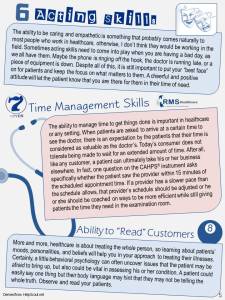This blog post was authored by Megan O’Donnell, Manager of RMS Healthcare at Research & Marketing Strategies (RMS). This article is part 3 of a 5 part series on 15 skills that healthcare employees need to be successful. It is based on an article written by HelpScout.net article titled “15 Customer Service Skills that Every Employee Needs”, written by Gregory Ciotti. To obtain the full white paper with all 15 skills from RMS, contact Megan at 1-866-567-5422 or email at MeganO@RMSresults.com.
- Time management skills – The ability to manage time to get things done is important in healthcare or any setting. When patients are asked to arrive at a certain time to see the doctor, there is an expectation by the patients that their time is considered as valuable as the doctor’s. Today’s consumer does not tolerate being made to wait for an extended amount of time. After all, like any customer, a patient can ultimately take his or her business elsewhere. In fact, one question on the CAHPS® instrument asks specifically whether the patient saw the provider within 15 minutes of the scheduled appointment time. If a provider has a slower pace than the schedule allows, that provider’s schedule should be adjusted or he or she should be coached on ways to be more efficient while still giving patients the time they need in the examination room.
- Ability to read customers – More and more, healthcare is about treating the whole person, so learning about patients’ moods, personalities, and beliefs will help you in your approach to treating their illnesses. Certainly, a little behavioral psychology can often uncover issues that the patient may be afraid to bring up, but also could be vital in assessing his or her condition. A patient could easily say one thing but their body language may hint that they may not be telling the whole truth. Observe and read your patients.
- A calming presence – Delivering bad news is often an unfortunate part of the healthcare field. Remaining calm and reassuring to the patient during this time, even if the patient is angry, distraught, scared, or nervous will allow you to assuage those feelings and comfort the patient. By allowing them to express their feelings while remaining calm, you increase their level of trust in you, thus strengthening your relationship with that patient.
To access the full white paper for this article including all 15 Skills Needed for Healthcare Employees contact Megan O’Donnell. Her contact information is accessible in the first paragraph of this blog post. For more information on Research & Marketing Strategies, Inc. (RMS), please visit our website by clicking here.

